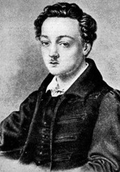Events
- 9 February – Prussia abolishes the canton system and establishes universal conscription.
- 28 February – Napoleonic Wars: Treaty of Kalisch – Prussia and Russia sign alliance against France
- 4 March – The French garrison evacuates Berlin, leaving Russian troops able to reach and take the city without a fight.
- 14 March – Mecklenburg-Schwerin joins the coalition
- 17 March – Prussia declares war on France, establishes Landwehr and introduces the Iron Cross military award (backdated to 10 March) and issues An Mein Volk proclamation
- 18 March – Russian Cossacks capture Hamburg
- 5 April – Battle of Möckern: Prusso-Russian victory over France
- 20 April – Saxony signs treaty of armed neutrality with Austria
- 21 April – Frederick William III of Prussia establishes the Landsturm
- 25 April – Bavaria announces its neutrality
- 27 April – French garrison of Spandau capitulates
- 2 May – Battle of Lützen – Napoleon wins against the German alliance.
- 20/21 May – Battle of Bautzen – French victory over the coalition
- 26 May – Battle of Haynau – Prussian victory against France
- 31 May – French troops retake Hamburg
- 4 June – Battle of Luckau – Coalition victory
- 4 June – Truce of Pläswitz begins between France, Prussia and Russia
- 14/15/27 June – Treaties of Reichenbach – between Great Britain, Prussia, Russia and Austria
- 12 July – Trachenberg Plan adopted by the Allies
- 11 August – Austria declares war on France
- 16 August – The truce ends
- 23 August – Battle of Großbeeren: Napoleon is defeated by Prussia and Sweden.
- 26 August – Battle of the Katzbach: Napoleon's troops are defeated by Prussia and Russia.
- 26–27 August – Battle of Dresden: Napoleon's troops are victorious.
- 27 August – Battle of Hagelberg: Prusso-Russian victory
- 29–30 August – First Battle of Kulm: French Marshal Vandamme is defeated and captured, by allied Coalition forces from Russia, Prussia and Austria.
- 4 September: In the gaming records of Hans Carl Leopold von der Gabelentz the name of Germany's national card game, "Scat" (now Skat, appears for the time.
- 6 September – Battle of Dennewitz: The armies of Napoleon are defeated by Prussia and Russia.
- 9 September – Treaty of Töplitz – between Prussia, Austria and Russia
- 17 September – Second Battle of Kulm: The Allied Coalition is victorious; Napoleon is forced to halt his advance on Teplitz.
- 18 September – Battle of the Göhrde – Coalition victory
- 28 September – Battle of Altenburg – Coalition victory
- 29 September – Combat of Roßlau – Coalition victory
- 3 October – Battle of Wartenburg – Prussian victory

- 8 October – Treaty of Ried – Bavaria allies with the Coalition against France
- 14 October – Bavaria declares war on France
- 16–19 October – Battle of Leipzig: Napoleon is defeated by the forces of the Sixth Coalition. More than 600,000 troops are in the field, with well over 20% killed, wounded or missing. Many of the German states forming the Confederation of the Rhine defect from Napoleon to the Coalition, as a result of the battle.
- 26 October – King Jérôme leaves Kassel, effectively dissolving the Kingdom of Westphalia
- 30–31 October – Battle of Hanau: Napoleon defeats Bavarian-Austrian force.
- 2 November – Treaty of Fulda – Württemberg joins the Coalition
- 11 November – French garrison of Dresden capitulates
- 20 November – Baden joins the coalition
- 21 November – William I enters Kassel and is restored as Elector of Hesse
- 23 November – Hesse-Darmstadt and Nassau join the coalition
- 7 December – Battle of Bornhöved
- 8 December – Ludwig van Beethoven's Symphony No. 7 , together with his Wellington's Victory , are premiered in Vienna under the composer's baton, in a benefit concert for Austrian and Bavarian soldiers wounded at the Battle of Hanau.
- 10 December – Battle of Sehested
- 31 December – Blücher's Army of Silesia crosses the Rhine

